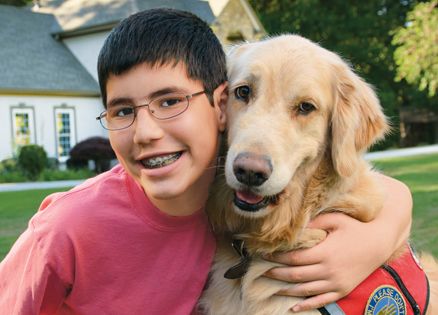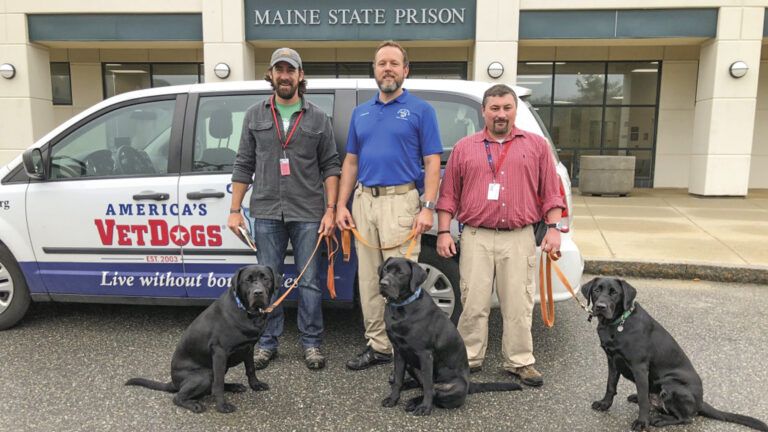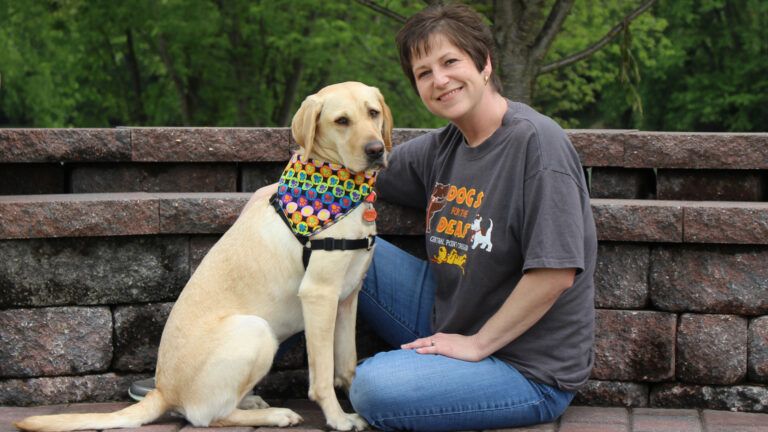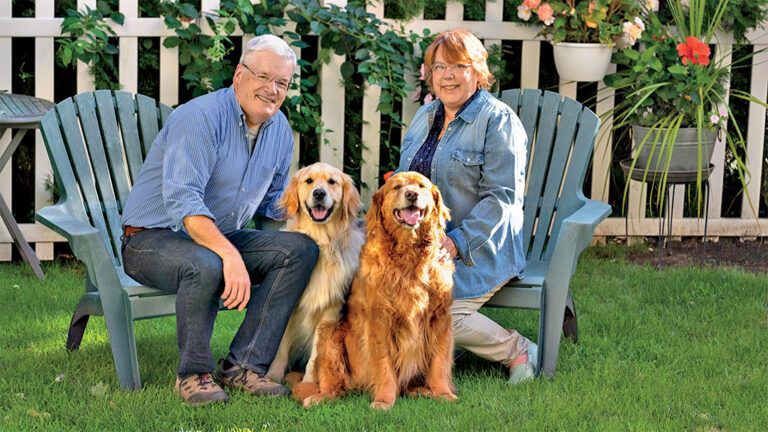Dogs. That was the smell permeating the classroom at the 4 Paws for Ability service-dog facility. I took a deep breath, wanting to take it all in.
We’d driven 500 miles from our suburban Atlanta home to this former VFW hall in Ohio to pick up the dog the trainers here had spent the better part of a year readying for us. More specifically, for my 10-year-old adopted son, Iyal, who has fetal alcohol syndrome (FAS), leaving him with a constellation of developmental disabilities.
My husband, Harvey, and I loved Iyal as if he were our own flesh and blood. Possibly more. Yet that love seemed powerless to stem his extreme impulsivity, his lack of a sense of consequences, his irrational thinking and explosive rages.
He was besieged with night terrors. He couldn’t communicate beyond the level of a preschooler or explain what he was feeling, his grammar rudimentary at best. He struggled to connect with others, even those who loved him.
Yet I saw how desperately he wanted friends. I ached for him. I’d tried everything to reach Iyal, offer him some understanding of the world outside himself. Daily, the strain tore at our family, unraveling the safety net we tried to weave around him.
This was my last resort. I drew the doggy odor into my lungs. Hope, I tried to tell myself, it smells like hope.
I crouched by our dog’s crate, flanked by Iyal and my daughter, Morasha, two days younger, both adopted from Russia when they were 14 months old. An enormous golden retriever peered out at us, with an expectant smile.
“Hey, Chancer,” I whispered. He looked happy, friendly, eager to please. But could even the most perceptive dog understand Iyal’s anguish? What if Iyal hit Chancer when he was upset? Even for 4 Paws this was new territory, Iyal their first client living with fetal alcohol syndrome.
“Okay, let’s meet your dogs,” the head trainer, Jeremy Dulebohn, announced to the class, all families whose children had special needs. We’d come for 10 days of training, required before we could take our dogs home.
I slipped the crate latch. Chancer bounded out, tail wagging exuberantly. Morasha got down on his level. “He’s beautiful,” she said. I stroked his head and he licked my hand. “Good boy,” I offered. Iyal patted Chancer’s side, then wandered out of the classroom.
“Iyal! Come back,” I called. He didn’t even turn his head.
“I’ll get him,” my dad said. “Focus on Chancer.” 4 Paws required two adults to attend the training, and I needed someone to help watch Iyal. My dad and cousin had flown in.
Harvey wanted to come, but as the founding rabbi of a smaller synagogue, he felt his extended absence would be a hardship on the staff.
“Dogs don’t judge,” Jeremy said. “They don’t see a person with disabilities. They see someone who can give them love. They think, ‘What can I do to get a treat?’ Right now it seems overwhelming, but once you learn the basic commands, you’ll be able to relax and let your dogs do the work. Remember, we’ve done ninety percent of the training for you.”
Since receiving Iyal’s FAS diagnosis in 2002, I’d tried various therapies and medications for him, structured his days, changed his diet and reframed my thinking. After five years of little progress I wasn’t looking for miracles anymore. A good night’s sleep would be a gift.
But for Chancer to bond with Iyal, to think of him as his boy, wouldn’t they actually have to spend time together? “Stand in front of your dogs,” Jeremy instructed. “Using their name, tell them to sit.”
“Sit, Chancer,” I said. He settled on his haunches inside a circle on the floor, eagerly watching my hand. “Good dog!” I held out a treat. Chancer inhaled it.
“Let’s do it again,” Jeremy said. “Dogs respond to one of three things—food, toys or praise. They learn through repetition and positive reinforcement.”
Chancer liked food. That was clear. And repetition? I knew what that meant, all too well. Iyal had trouble remembering instructions from one day to the next. Don’t squeeze the cat. Don’t go out of the house. Don’t crowd your sister.
No matter how I repeated myself, I couldn’t seem to make the world understandable to him or convey that there were basic rules. In truth, it was equally hard for us to understand what was swirling through his mind. The slightest change in routine or simply telling him no could spark an uncontrollable outburst.
Yet Harvey and I were certain Iyal and Morasha were meant to be in our lives. We’d struggled with infertility and were in our forties when we saw them on a referral video from a Russian orphanage. It was divinely ordained destiny. Beshert, in Hebrew. God’s will.
Our first two years as a family were a time of joy. Then shortly after the kids’ third birthday we noticed disturbing changes in Iyal. He couldn’t fall asleep or stay asleep. He became agitated at the smallest things. He threw a chair at a classmate in preschool.
“It’s just a stage,” friends at temple said. But we knew something was very wrong.
Pediatricians and child psychiatrists couldn’t agree on a diagnosis. Finally a developmental pediatrician noted Iyal’s small head, the thin upper lip and lack of crease between his mouth and nose, the wider space between his eyes.
“Your son has fetal alcohol syndrome, the most severe expression of fetal alcohol spectrum disorders,” he told us. “When a mother drinks during pregnancy it can cause irreversible developmental and neurological damage. While largely invisible to others, the behavioral effects will become more challenging as he gets older. This is a lifelong birth defect.”
It’s common for kids from overseas orphanages to have developmental issues, but irreversible brain damage? I was devastated, engulfed by grief.
Spurred on by my maternal instinct and a need to do something, I devoted myself to Iyal’s care, shedding activities from my former life. I consumed research on FAS D, spent hours online with other moms whose kids had experienced prenatal alcohol exposure.
People began coming to me for advice. I founded the Georgia state affiliate of the National Organization on Fetal Alcohol Syndrome. Advocacy became my full-time job.
But what about the answers I needed? As Iyal reached school age, his tantrums morphed into limbic rages. He’d pull away from me and run into the street in front of cars, unaware of danger. Sometimes nights were worse than the days.
“Donnie, how can we go on like this?” Harvey said early one morning after we’d gotten Iyal back to bed. “It’s not fair to Morasha. Iyal’s disabilities have taken over our lives. We need help, maybe a special-needs nanny? Something.”
God, why can’t I give my son what he needs? I asked, not for the first time. I felt like I’d failed Iyal, failed God. After all, hadn’t God given me Iyal to raise and love?
Then I stumbled across the website for 4 Paws. They trained service dogs for kids in wheelchairs, with seizure disorders, with psychiatric illness, with autism. Each dog was trained to match a specific child. I couldn’t wait to tell Harvey.
“Are you sure?” he said. “Like we need more responsibility. People don’t mean much to Iyal. Why would a dog?”
“But they each get five hundred hours of training.”
“No,” he said. “Please, Donnie. No dog.” I knew we were both at the breaking point. Still, if I could just get a little more information…
I called Karen Shirk, the director of 4 Paws. She had her own concerns. “Is your son likely to scream at a dog?” she asked. “Would he ever hit a dog?”
I swallowed. “He might.”
Silence. I braced myself.
“Okay,” Karen said. “You must have a doctor’s prescription and we’ll need you to make a video. We want to see Iyal from morning till night, every noise he makes, all of his disruptive behaviors, every tantrum. But I have to warn you, this is a major commitment and one out of ten dogs that we place doesn’t work out.”
Now, in this VFW hall in Ohio, that conversation seemed like a dream. Except here I was looking into the eyes of a very real golden. I glanced at the other families in the class, the kids bonding with their dogs. One in ten. What if we were the family that didn’t work out?
We practiced sit, then stay. Iyal came and plopped himself in the middle of Chancer’s circle. He wouldn’t budge. The class came to a halt. “I’m so sorry,” I gasped. “Iyal, get up!” I implored as loud as I dared, afraid of a meltdown.
Jeremy had taught Chancer three special skills: nuzzling against Iyal at the first sign of agitation; if Iyal was on the floor, climbing on top of Iyal’s legs and lying down (the pressure calming him); and tethering.
This required Iyal and Chancer to wear special vests tethering them to each other. On command Chancer would drop to the ground, keeping Iyal from running off.
Now Chancer looked on, head cocked in bewilderment. “It’s okay,” Jeremy said. “We’ll wait.” Finally Iyal moved. But by then I could feel the glow of hope inside me fading.
The next day Chancer sat, lay down and stayed like a pro, but there was no sign of any connection with Iyal. When it came time to practice tethering, Morasha stood in for Iyal. Does Chancer even know Iyal exists? I wondered. And vice versa?
That evening we took our dogs back to the hotel for the night. I put Chancer’s crate at the end of Iyal’s bed, exhausted. My cousin took Chancer for a walk. “Why don’t the kids and I go down to the hot tub?” my dad offered. I was glad for the chance to be alone.
All too soon there was the sound of the door swinging open, the kids, my cousin and Dad bursting into the room, Chancer leading the way, dripping. My nose wrinkled at the odor of wet dog.
“You’ll never guess what happened!” Dad said. “The kids were in the hot tub. When Chancer came back from his walk he looked right at Iyal, alerted and…”
“He jerked the leash right out of my hand,” my cousin interjected excitedly. “The next thing I knew he was in the hot tub trying to save Iyal. And Iyal…I’ve never heard him laugh like that.”
I looked at my son, a trace of a smile on his lips. My son and his dog. And so much more. This was beshert, as unmistakable as the smell of hope that lingered in the air.
Eight days later we pulled into our driveway. Harvey hugged us tight, especially Chancer. “Welcome to the family,” he exclaimed. I thought Chancer’s tail would fly right off his hindquarters!
The next morning I awoke to sunlight streaming through our bedroom window. We’d slept through the night? Where was Iyal? Harvey and I raced to his bedroom. Iyal was snuggled up to Chancer, both sleeping peacefully.
That afternoon I asked Iyal to turn off the TV. His brow furrowed, lips trembled. Then Chancer trotted purposefully past me. He nuzzled Iyal, placing his body on top of him, licking his face until Iyal was laughing! Not screaming, laughing!
About six months later, I was in the kitchen, Iyal beside me, petting Chancer. Suddenly he said, “Mommy, do you think Chancer knows I love him?”
Was this for real? My son, who had never uttered such a complex sentence, let alone expressed awareness that someone might have feelings different from his own? “Yes,” I said. “He knows. And he loves you, just like Morasha and Daddy and I love you. Like God loves you.”
Iyal nodded. “I’m glad,” he said.
Two sentences. A miracle that I never expected, that I was guarding against because I was afraid to hope. Not anymore. It’s been four years since we brought Chancer home. There’s still plenty of stress, adolescence creating another layer of challenges for Iyal.
Still, the difference Chancer has made is profound. Scientists theorize that Chancer’s calming influence allows Iyal’s brain to relax, making possible the observations, self-reflection and thoughtful questions that continue to stream from his lips.
My theory? My son and his dog coming together was beshert. God’s will.
Learn more about the dog-training organization 4 Paws for Ability.






